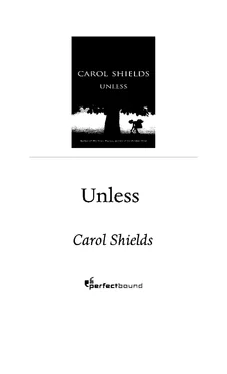Carol Shields - Unless
Здесь есть возможность читать онлайн «Carol Shields - Unless» — ознакомительный отрывок электронной книги совершенно бесплатно, а после прочтения отрывка купить полную версию. В некоторых случаях можно слушать аудио, скачать через торрент в формате fb2 и присутствует краткое содержание. Жанр: Современная проза, на английском языке. Описание произведения, (предисловие) а так же отзывы посетителей доступны на портале библиотеки ЛибКат.
- Название:Unless
- Автор:
- Жанр:
- Год:неизвестен
- ISBN:нет данных
- Рейтинг книги:4 / 5. Голосов: 1
-
Избранное:Добавить в избранное
- Отзывы:
-
Ваша оценка:
- 80
- 1
- 2
- 3
- 4
- 5
Unless: краткое содержание, описание и аннотация
Предлагаем к чтению аннотацию, описание, краткое содержание или предисловие (зависит от того, что написал сам автор книги «Unless»). Если вы не нашли необходимую информацию о книге — напишите в комментариях, мы постараемся отыскать её.
Unless — читать онлайн ознакомительный отрывок
Ниже представлен текст книги, разбитый по страницам. Система сохранения места последней прочитанной страницы, позволяет с удобством читать онлайн бесплатно книгу «Unless», без необходимости каждый раз заново искать на чём Вы остановились. Поставьте закладку, и сможете в любой момент перейти на страницу, на которой закончили чтение.
Интервал:
Закладка:
“It’s been nominated for the Booker, you know.”
“Thanks,” I say in an immaculate tone, “both of you.”
They beam. And wait for more.
“How’s Norah? Any news? Is she coming home soon?”
No, she will not be home soon. That is perfectly clear. “I’m not sure when she’ll be home.
Nothing much has happened.”
The fact is, Tom and I don’t use the library nearly as much as we used to. Tom orders his books — mostly about trilobites — through Amazon.com, and I tend to pick up what I need in Toronto.
“How’s she doing?” From Cheryl.
“Reasonably well. As far as we know.”
Ah! They exchange glances. Tessa, who has some of the rough, shaggy manners of our own Pet, reaches awkwardly over the counter and embraces me. “She’ll get through this nonsense.” She fixes me with a snagging look of determination and strength, that “carry on” look that brings tears to my throat.
It was Tessa who alerted us to Norah’s whereabouts last April. We hadn’t heard from her for over a week. Tom thought Norah had quarrelled with her boyfriend, but I knew better.
When we tried to phone we could never get through. Her last visit home at the end of March had been deeply disturbing. I thought several times of getting in touch with the university, but the idea seemed ridiculous, parents checking up on a grown daughter. We were worried, worried sick. Springtime depression. The thought of suicide. Only recently a Muslim woman had set herself on fire in Toronto. I read something about it in the paper. Then Tessa happened to go into the city to visit her elderly mother, and there she caught a glimpse of Norah when she came up out of the subway. Norah, sitting on the sidewalk, begging.
“Norah?” Tessa said.
Norah looked up. Of course she recognized Tessa at once, but she said nothing. She firmed her grip on the little square of cardboard and thrust it at Tessa. It must have been a cool day, Tessa remembers, because Norah was wearing a pair of old gardening gloves, far too big for her small hands.
“Norah,” softly, “do your parents know you’re here?”
Norah shook her head.
Around the corner, Tessa opened her bag, fished out her cell phone, and reached me in Orangetown. Luckily, Tom was home. We got straight into the car and drove to Toronto. All the way, my chest was convulsed with pain. The air we breathed was shaking like a great sail.
I’m supposed to be Reta Winters, that sunny woman, but something happened when her back was turned. Reta’s dropped a ball in the schoolyard, she’s lost that curved, clean shell she was carrying home from the beach. And these two women — Tessa and Cheryl — know what I am, standing here juggling my cascading images of before and after, all my living perfume washed off because my oldest daughter has gone off to live a life of virtue. Her self-renunciation has even made her choose a corner of Toronto where the pickings are slim. I had to explain the situation to my other daughters, how their sister Norah was in pursuit of goodness. I remember that I sketched in the picture fast, using the simplest and shortest words I could find, as though a summary would take the sting and strangeness away. Yes, a life of goodness, that’s what she’s chosen.
They’ve been expecting me at the library; I always phone ahead. They have six books stacked on the counter, The Goodness Gap on top, then the Atwood, then a biography and a couple of slender new mysteries for my mother-in-law, Lois, and a copy of The Waves for Christine, who has just discovered Virginia Woolf. These books have been carefully chosen.
Just the right degree of narrative packing for me, nothing too dark or New Agey; literary novels, but not postmodernly so; no “poetic” novels, please; no insulting trash. An exotic setting is always nice. But nothing about rich people or people who go to lunch — that is, people who know “where” to go to lunch, those smart-edged professionals who “want a life,” as if they weren’t getting one. Nothing hip. No family sagas, no male bonding with nature stuff. No horses. No poetry or short stories, not for the moment; they don’t work.
Cheryl slides the little tower of books toward me slowly, as though they were gathered treasure aboard the deck of a schooner. Their bright new covers gleam in plastic library coats, catching warm bars of light from overhead. I dig into my bag for my library card, grateful.
The reading room today is, as usual, lightly scattered with housewives and seniors, a few students, several of whom I recognize, and one or two strangers. These people move through the stacks or sit quietly at the old oak tables, turning the pages of reference books, poring over newspapers, glancing up when the door opens or closes, looking around and observing the quiet activity, and then retreating to print. This might be a private club, with everyone so relaxed and polite and obeying the rules.
No one actually stares, but they know who I am. I’m Reta Winters, the doctor’s wife (that fine man!), the mother of three daughters, the writer. I live five miles out of town, in what used to be the countryside but is now becoming more and more a part of Orangetown, almost a suburb, if a town of five thousand can have a suburb. In our big old house, it could be said, we live the life we long ago chose: abundant, bustling, but with peaceful intervals, islands of furniture, books, music, soft cushions to lean into, food in the fridge, more in the freezer. I work as a writer and translator (French into English). And I am the mother of Norah Winters, such a sad case. They remember seeing her around town, a striking girl with fine features, tall like Tom, sometimes riding her bike up Main Street or sitting with her friends in front of the high school, that long straight blonde hair of hers, those strong slender legs testifying to the loose agility of the young. She had a smile that cut like a crescent through her whole body.
She went away to university in Toronto, where she had a boyfriend, then she went missing for a few days last spring, then she turned up on a Toronto street corner. The word’s got around.
They nod in my direction or else they utter greetings under their breath. “Afternoon.”
Blessings that I return with a congenial dip of my head as though I were sniffing a nosegay.
I’m braced by people’s steady repeatable gifts of acknowledgement, and am reminded of what I seem to be waiting for, what all of us wait for: that moment of grace or surprise that has left us but will certainly return. It always does. I believe this, more or less.
In half an hour — I will be gone by then — Cheryl will ring a little bell and move from table to table, announcing in her tender girl’s voice that the library will be closed in five minutes. She will say this with a plunge of apology; she is genuinely sorry to break through the thread of her clients’ thoughts and regretful about disturbing the concentration of perception and silence that the library has promised each of its visitors and that has accumulated during the long sleepy afternoon. There is no longer enough money to keep the library open on weekday evenings. This is not Cheryl’s fault, but she feels sorry about the situation and hopes that they will understand.
I glance around at my fellow citizens as I deposit the books in my sack, and I feel a surge of love for the arbitrariness of our arrangements, that we should be assembled here together in this particular compartment of time, sharing public space, at one with each other in our need for retreat and for the printed word. There’s Mrs. Greenaway, with her impossibly narrow nose bridge, smiling perpetually, an intelligent woman with no place to stow her brand of originality. Mr. Atkinson, retired teacher, his tie sunk into the fat of his neck, the Britannica opened on the table before him, to a map of some sort. There’s a bearded man whose name I don’t know but who seems to be scribbling a novel or a memoir into a series of spiral notebooks. There’s Hal (Swiftfoot) Scott, who pumps gas and plays hockey, or at least he did before he got caught in a drug bust last year. He’s reading Maclean’s, probably the sports section.
Читать дальшеИнтервал:
Закладка:
Похожие книги на «Unless»
Представляем Вашему вниманию похожие книги на «Unless» списком для выбора. Мы отобрали схожую по названию и смыслу литературу в надежде предоставить читателям больше вариантов отыскать новые, интересные, ещё непрочитанные произведения.
Обсуждение, отзывы о книге «Unless» и просто собственные мнения читателей. Оставьте ваши комментарии, напишите, что Вы думаете о произведении, его смысле или главных героях. Укажите что конкретно понравилось, а что нет, и почему Вы так считаете.












